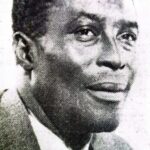GRANT, GEORGE ALFRED
- 4 Min Read
George Alfred Grant (August 15, 1878 – October 30, 1956), one of the prosperous merchants of his day, was the first president of the United Gold Coast Convention (U.G.C.C.), the nationalist party he founded in 1947 with Dr. J. B. Danquah.

PHOTO CAPTION: George Alfred Grant. SOURCE: EA Library
He was born at Beyin, a small coastal village between Axim and the Ivory Coast frontier in what is now southwestern Ghana, and was the son of William Minneaux Grant and Adwoa Biatwi of the Aboradze clan. On his father’s side, he was the grandson of Francis Chapman Grant, a well-known merchant. George Grant was educated at the Cape Coast Wesleyan School, and was privately tutored by Chief Joseph D. Abraham, a wealthy Cape Coast merchant who was his father’s friend. He left school in 1895, and went to Axim, the coastal town 38 mi (60 km) west of Takoradi, to study the timber trade. Later he went to the Ivory Coast to work for an English timber-exporting firm.
After five years in the Ivory Coast, Grant decided to start his own timber business. Returning to the Gold Coast, he began exporting mahogany to England in 1903. In 1905, he visited England and improved his business contacts. By 1909 his business was established in Axim, and he himself was soon acknowledged as an authority on West African timbers by British and American firms. Between 1914 and 1919, he chartered ships to trade with England and the United States, making enormous profits. Between 1920 and 1922 he opened offices in Hamburg Germany and in London and Liverpool in Britain. He bought a German minesweeper, manned it with British and German crews, and used it to trade between Gold Coast and European ports. The ship later sank near Axim. He also owned several motor launches which he used for local trading.
By the time of the outbreak of World War II in 1939, Grant had expanded his operations to Sekondi, Dunkwa (70 mi or 112 km to the north), and to parts of the Central Province, to the east. By the end of the war in 1945, he was also operating in the state of Akyem Abuakwa, some 50 mi (80 km) north of Accra in the Eastern Province. When the British colonial government had to control timber exports during this period, Grant was appointed a member of the export control committee where his opinions were highly valued.
He had served briefly from 1926-1927 in the Gold Coast Legislative Council as a nominated member for the Western Province, and in that capacity recommended the extension of piped water supplies, and the introduction of street lighting in certain towns, and the expansion of hospital and school facilities.
He did not consider wealth as an end in itself, and after the introduction of the Burns Constitution of 1946, decided that an organised nationalist movement was needed to lead the Gold Coast to independence. He therefore invited J. B. Danquah to his house at Sekondi in early 1947. As a result of their discussions “Pa” Grant (as he was popularly known) sent a letter dated March 21, 1947 to some personalities, inviting them to meet at Saltpond on April 7, to discuss the formation of a national political organisation, and to appeal to the country to support it. It was this meeting which recommended the formation of the United Gold Coast Convention (U.G.C.C.), which was inaugurated at Saltpond on August 4, 1947 with “Pa” Grant as President.
Grant, Danquah and others later agreed to a suggestion that Kwame Nkrumah should be invited to return home from England to become secretary of the new party. After Nkrumah’s arrival, and the riots of February 1948 following the shooting of ex-servicemen protesting against living conditions, the U.G.C.C. Executive, with grant’s approval, sent telegrams to the British government asking for the transfer of power to the people of the Gold Coast. The train of events that was to culminate in the independence of Ghana in 1957 has begun. The events which led to the breach between Nkrumah and the U.G.C.C. saddened Grant and he did his best to achieve a reconciliation. When that failed, he backed the U.G.C.C.
Old age and illness made him inactive politically in the period which followed the gaining of power by Nkrumah and his Convention People’s Party (C.P.P.). He died on October 30, 1956.
L. H. OFOSU APPIAH




